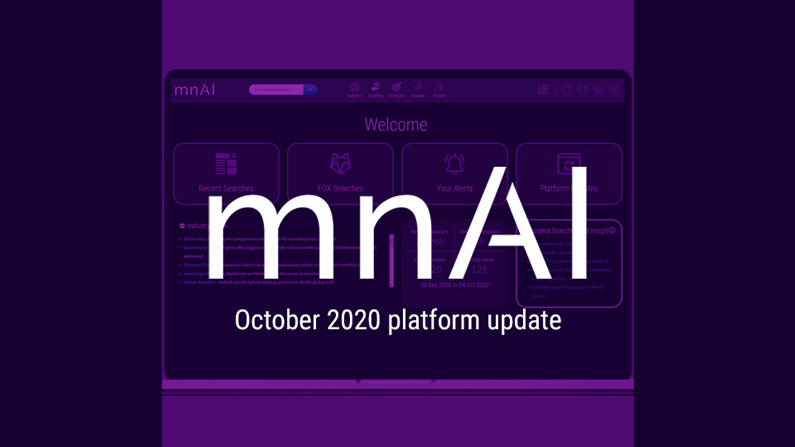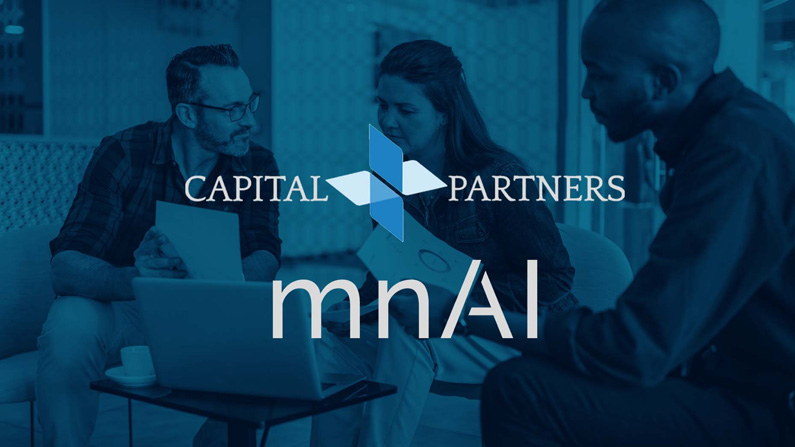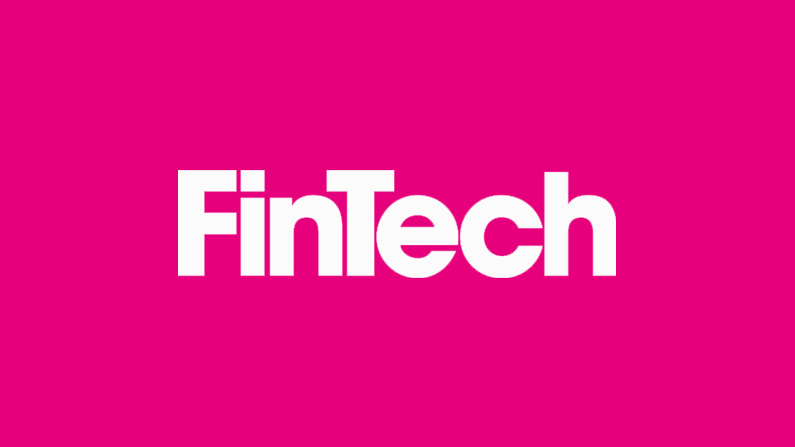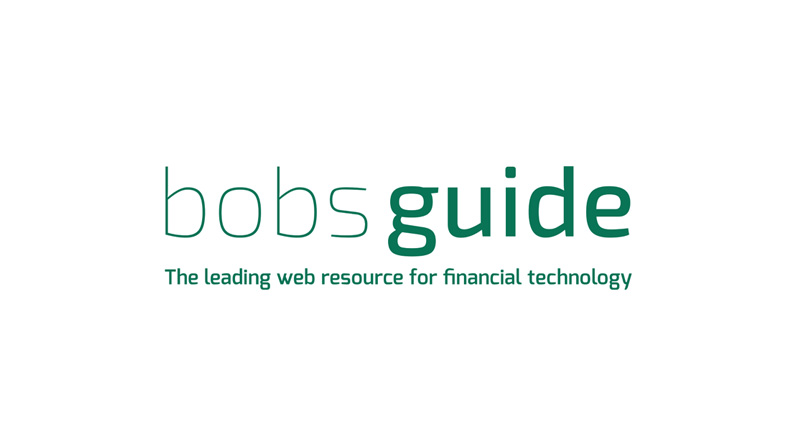October 2020 platform update

Our latest platform update 20.10 is now live for all users. This update brings a host of new visual changes, new features and better performance to provide a greater experience. If you are new to us or want to explore mnAI for you or your team please contact us at sales@mnai.tech to book a demo.
The Drawdown’s Private Equity Service Provider 2020

We’re delighted to announce that mnAI has shortlisted in two categories in “The Drawdown, Private Equity Service Provider, 2020” – Technology: Innovation – Technology: Information and Data Provider The Private Equity Service Provider Awards is the most prestigious PE Service Provider awards ceremony in Europe. The rigorous judging process, based on the views of a panel of leading private equity COOs, CFOs, CCOs, GCs and CTOs, ensures these awards stand out from the crowd as ‘ones to win’ and we hope they act as a catalyst to drive up service standards across the sector. The full list can be found here: https://pespa.the-drawdown.com/categories. From mnAI, Founder & CEO, John Cushing “The Private Equity Service Provider of the year awards showcase the very best providers within the PE sector across Europe. To have received two nominations within the Technology category is a fabulous achievement especially when you consider the volume and diversity of applicants from across the continent. We thank the judges for their recognition and look forward to the awards ceremony later this year.”
How Capital Plus partners use mnAI to accelerate corporate finance operations

Capital Plus Partners – Piers Denne As a team of corporate financiers, across sell-side, buy-side and capital raising, mnAI provides our team with a one stop platform to find acquisition targets, UK industry, Director and other detailed company information. The process of streamlining company searches is saving us hours and hours of daily manual searches and ultimately cost. Key industry insights provided through automated search function. Company / target financial data, on a slick user interface easy to read and interpret. The majority of data on the platform is also exportable via CSV and PDF format so that we can present and adapt data as required. It streamlines our due diligence process, making it easier/simpler to give a top level assessment of a corporate client’s financial health. It also provided clear historic data of relevant competition to our client companies, which can normally be hard to find. Another innovative function we are finding highly useful is the Director network mapping tool. This enables us to identify and target associated / linked companies through listed directors, streamlining our origination process by enabling us to identify the correct company/ person to approach within that organisation. Find out more about Capital Plus Partners at : https://capplus.co.uk/
How AI can help financial services

The financial services (FS) industry is going through a period of profound change and disruption. Technology provides the means for firms to reimagine the way in which they operate and interact with their customers, suppliers, and employees. One particularly significant area of development is the utilisation of artificial intelligence (AI) and machine learning (ML). The pace of AI and machine learning application is clearly accelerating as companies begin to leverage it to increase efficiency and innovation to gain a competitive advantage in the marketplace. Financial services organisations have a long history of working with data, for example using analytics to extract insights for creating better, more profitable business models, investment strategies and improving the customer experience. The challenge lies in organising and managing this data, verifying its accuracy and capitalising on the opportunities it provides. Automation can enable regulatory compliance, improve business performance, drive cost-savings and efficiencies, rapidly analyse and spot trends, create new value propositions and promote quicker decision making. This creates a cycle of innovation across a wide range of business functions and a reimagined customer experience. Machine learning platforms rely on quality data being input, as well as the interpretation of that data. Firms are not quite ready to let the machines do everything and skilled human intervention is still required. Automation will be key in how the financial industry operates and delivers services, and for it to compete and thrive. According to consulting firm Accenture, the contribution of automation and augmented technologies to the bottom line for financial services companies around the world is estimated at $140 billion in productivity gains and cost savings by 2025. Algorithmic trading has long been a primary user of it, but below are four additional ways the financial industry is rapidly adopting Artificial intelligence: Reason 1 : Greater customer engagement with AI Artificial intelligence can reduce the process of customer identification and due diligence from many hours of manual research down to minutes. Using billions of publicly available data points search engines allow companies to find and research individuals and companies which meet exact criteria quickly and easily. Financial companies can then use artificial intelligence to transform the customer experience by enabling frictionless, 24/7 customer interactions. Some have introduced chat bots backed by conversational AI abilities which can answer customer questions, manage customer requests, and make product recommendations. There are even robo-advisers which create personalised investment portfolios, obviating the need for more expensive stockbrokers and financial advisers. Reason 2 : Better fraud detection and risk management The complexities of the ever-changing regulatory landscape can be challenging for many financial institutions. Artificial Intelligence can “learn”, remember, and comply with all applicable laws – from Know Your Customer (KYC) and anti-money laundering regulation to rules governing asset management. Current systems generate a lot of false positives that are reviewed individually by middle-office operators and/or compliance officers. Machine learning can reduce bias, interpret, identify patterns and ultimately reduce the number of false positives, saving costs while increasing the quality of the screening process. Reason 3 : Transforming the deal process for Financial Services For deal professionals, ML is not just an exciting source of new transaction flow. It can now be applied to every part of the deal process, from tracking and sourcing deals through to due diligence, execution and post-deal integration. AI-powered deal-flow search engines can help executives improve the effectiveness and efficiency of the deal process. They automate tasks, smooth workflows, and scrutinise company data and information- completing processes that would take months of an analyst’s time in minutes. Deal-flow platforms can visually chart and track balance sheets, profit and loss, creditors, debtors, debt, shareholders, connections, contacts and introductions. This enables dealmakers to identify and assess targets, inform decision making and accelerate execution. AI-powered deal-flow search engines deliver actionable insights and trends even as underlying conditions change and develop. Reason 4 : Enhancing the Due Diligence process As an alternative to huge teams of people, a company can use a machine learning platform to rapidly examine thousands of uploaded employment, supplier and customer contracts. Artificial intelligence can run background checks on companies and people, alert for any issues and raise red flags. In the time consuming and complex discovery and analysis process of Mergers and Acquisitions, artificial intelligence can accelerate the process and provide analysts with a more comprehensive understanding and accurate view of the business or sector they are investigating. By John Cushing, mnAI CEO featured in FinTech Magazine. More from FinTech Magazine at : www.fintechmagazine.com
A new reality for M&A and Private Equity post COVID

John Cushing, CEO and founder of mnAI discusses with Real Deals the impact of the pandemic on the buyer’s market and shifting the M&A process online. COVID-19 is causing unprecedented disruption to the global economy. For most businesses, including those operating within the financial services industry, uncertainty is the new normal. There is no playbook to navigate the current situation so a certain amount of improvisation will be required to survive the crisis and then accelerate during the eventual recovery. Some businesses will react by shelving expansion plans and focusing on strengthening balance sheets and many will see a drop in demand and reduction in revenues and cash flow. As a result the M&A process will be severely disrupted. The overall value of M&A was $698billion in the first three months of this year, down from $964billion the previous year – the weakest year-opening quarter in four years according to financial data company Refinitiv. Full article available at : https://realdeals.eu.com/article/a-new-reality-for-ma
Financial Services Forum Awards 2020

We’re delighted to announce that mnAI has shortlisted in three categories in the Financial Services Forum 2020 awards for Product and Service Innovation! Since its launch in 2000, The Financial Services Forum has supported the improvement of financial services marketing, through a better understanding of the consumer, the marketplace and marketing performance. The importance of innovation in financial services today, and its vital role of engaging and empowering customers, has led to this awards program – recognising innovation in financial services that delivers tangible benefits to both consumer and provider. These awards focus on the overall impact that innovation has had on the sector and/or consumer, and whether the innovation achieved or exceeded its objectives and goals. For mnAI, co-founder & CTO, Andrew King: “The Financial Services Forum awards are highly coveted, and we know that we faced stiff competition to be shortlisted. To be amongst recognised high-street brands such as Legal & General, NS & I, Starling Bank and NatWest shows the calibre of the entrants. We wish all finalists good luck but naturally are keeping our fingers crossed in our categories!” Read more here: https://thefsforum.co.uk/
John Cushing CEO Interview – The Scotsman

Glasgow-born John Cushing is the founder and chief executive of mnAI, which is described as afintech“revolutionising” the due diligence process for deal-makers worldwide. mnAI says it is the world’s first artificial intelligence-powered mergers and acquisitions (M&A) deal-flow search engine – cutting the time it takes to identify and understand relevant businesses and individuals from months to minutes. It harnesses more than 55 million financial records of UK companies from the past decade, and allows users to determine future-based core earnings, for example. Cushing previously founded the contracts division for Probe IT. He then moved to start PPR Solutions, and proptech firm Opun, both of which had successful exits to ByBox and John Lewis respectively. Our target audience includes private equity, M&A, wealth-management, family offices, property, professional and financial services – although, in practice, you can extend this to anyone who requires information on companies and related people in the UK. Initially, the platform was designed to provide detailed insight and analytics at a company level only, but with an expanded dataset. We added bespoke industry insights and analytics that a user can self-generate. The platform also offers detailed information on officers and shareholders that can further be filtered by gender, enabling very precise targeting of an industry, companies, directors or shareholders. Full Interview here www.scotsman.com/business/big-interview-john-cushing-founder-and-chief-executive-mnai-2550163
How AI helps wealth management professionals perform due diligence

More recently, the business’s chief executive and founder, John Cushing, explained why such an offering matters to the wealth management community. “An industry trend over the last few years is how the largest investment houses have come down the food chain to acquire more interesting and faster-growing businesses,” he told this news service in a call. Another force at work is that family offices and other UHNW investors want to cut out a layer of management fees and go direct, but to do that they need the calls. The digital tools offered by mnAI have prompted a big flow of inquiries, Cushing said. “We have first-mover advantage,” he said. “Lots of firms [investors] are still using Google and a spreadsheet [in performing investment due diligence],” he continued. AI can provide valuable data to investors in the early rounds of financing requests – however, it does not eliminate the need for human interaction and some manual checks and awareness, Cushing said. Full article please head to www.wealthbriefing.com
mnAI wins the Innovation and Excellence Awards, 2020 – SME Data & Analytics Provider of the Year!

Innovation and Excellence Awards 2020 – SME Data We’re delighted to announce that mnAI has won the Innovation and Excellence Awards, 2020 – SME Data & Analytics Provider of the Year! The Corporate LiveWire Awards represent the pinnacle of business achievement, championing the best in their respective fields. Our corporate awards cover the most important sectors of business, from Finance advisories, Funding providers to Law firms and specialist advisory companies that deal with mergers and acquisitions. The culmination of the awards is the Global Award, covering businesses of every type that have proven their excellence throughout the year and years past. For mnAI, CEO, John Cushing: “Winning the Innovation & Excellence Awards 2020 is great news and to take the top prize in the SME Data & Analytics category against such stiff competition is an incredible achievement for the team and an amazing start to 2020 – thank you to the judges and to everyone who voted for us!” Read more about the awards : www.corporatelivewire.com
How AI can help Private Equity identify and manage better investment opportunities

News stories of late have pointed to the need to compile and verify vital data on listed companies. The London Stock Exchange-listed company Lekoil, for example, fell afoul of an alleged fraudulent financing deal, while FTSE 100 firm NMC Health found itself embroiled in an investigation into incorrect shareholder reporting. For private equity firms, accessing current and precise information about potential targets is a necessity when carrying out due diligence and to inform speculative buyout offers. With large transaction volumes and complex business operations dictating an environment with increasingly strict regulations, historic due diligence processes such as those used by Companies House are not enough anymore. Artificial intelligence (AI) can tackle this. Such technology is affecting everything from business operations to consumer behaviour, reducing costs and increasing efficiencies, improving effectiveness and providing competitive advantages. AI can improve due diligence services using a risk-focused analytic approach which can look at real business performance and identify any inconsistencies. Such technology can be used to deal with the issues with traditional due diligence processes, providing sector and economic data in real time and supplying companies with a broader understanding and more accurate view of the business or sector they are investigating. The reality of Companies House M&A is important for all parties involved as capital and jobs are in the firing line. However, data shows that annually, nearly ten percent of all big mergers and acquisitions are not completed. The fallout from any deal cancellation can be extensive, impacting the share price and even the reputation of those involved, and resulting in advisory and termination fee costs, as well as proving a squandering of resources and time. In order to prevent against such detrimental situations, every possible acquisition needs to be analysed from every angle, with thorough due diligence performed to locate potential risks, confirm assumptions backing up the deal, gather necessary information and plan integration, while, in addition, gaining a more comprehensive knowledge of the business being acquired. Currently, Companies House holds records of companies as well as their filings, and is utilized by business leaders when considering targets for M&A and evaluating the risks and rewards resulting from a potential acquisition. This information is usually used alongside media databases including both national and specialist press, litigation databases and records on insolvency, civil debt judgements and bankruptcy. Changing the game with technology Businesses can make use of technology platforms to enable decision-making, improving the process for identifying and understanding a target company from months to minutes. AI can be utilised to speed up the whole process of an M&A deal, particularly in accounts receivable, real-time data collection, and in-depth research of business targets. AI-powered deal-flow search platforms use huge numbers of data points on UK companies, as well as office profiles, teaming this with SIC code searching with natural language search to provide predictive modelling for future valuations. Such AI technology can also present a chance for target companies to be M&A ready upfront. Lengthy amounts of time put into manual research can be reduced so that companies can more accurately predict financial growth, find peer analysis and online reputational, financial and combined credit scores, as well as looking at competitor research and analysis. Meanwhile, technology taking advantage of Baysesian mathematics and Random Forest Modelling can create predictive algorithms to determine future-based EBITDA and DCF valuations. It’s clear that business leaders must use the technology available in the industry to better prepare themselves for any M&A deal. Both directors and dealmakers need to rely less on Companies House if they are to reduce data discrepancies and take advantage of technologically powered data platforms to process, capture and verify data effectively. Such an approach would improve confidence and reduce the risk in the UK’s deal-making process. Looking beyond companies house Companies House holds the UK’s registry of corporate structures as well as data on shareholders, directors, accounts and partners. The UK, though, is one of the countries where it is easiest to create a company. To do so takes fewer than 24 hours and costs just £12. Companies House does not act to verify the information submitted to it and cannot usually amend or remove data on the register. Many are concerned therefore about the accuracy of Companies House data, since such data is vulnerable to criminal abuse, such as the deliberate entering of false information, and the duplication and misspelling of director names. The anti-corruption campaign group Global Witness investigated PSCs (person of significant control- the person who owns the registered company) in 2018 and found 4,000 of them were listed as being below the age of two, and one had not yet been born. The absence of checks in place to safeguard against such activity means bad actors can create fake ‘shell companies’ to facilitate the ‘cleaning’ of dirty money. Currently, there are 4.4 million active companies listed on its register, demonstrating that there is a high risk of criminal manipulation which is difficult to identify. Indeed, the government in May 2019 reacted to ongoing worries about Companies House by opening a consultation on changes to the system, considering providing the register with increased powers to look into companies’ data. These suggested changes would provide Companies House with increased powers to investigate the businesses on the register. Given the alterations will influence every part of their work, rehauling systems as well as staffing, the reforms are set to take years to implement and will require primary legislation to carry out.
The Added Due Diligence Pressure Of Public Ownership

2019 marked a record year for the private financing of fintechs and it is widely expected that this will remain the case for 2020, making the incentive to go public less compelling in today’s market – and that is without the added pressures of due diligence. “The due diligence placed on those seeking public ownership or a sale is generally understood to be far more rigorous than the scrutiny most start-ups undergo,” says John Cushing, chief executive and founder of mnAI. “These fintechs must therefore demonstrate a more robust and resilient business plan and point to real-world market results.” While fintechs are currently basking in the interest from private financers and are therefore shying away from going public for the time being, there are other influences that could have an impact on that IPO timeline. The Financial Services industry is ripe for disruption. Regulation, culture and legacy systems have held traditional players back, while allowing fintechs to evolve at a rapid rate. “Large banks now have to separate their investment activities from their retail operations, meaning that they can’t cross-subsidise or cross-support activities to remain competitive,” explains Mr Bradbury. “This provides the space for fintechs to compete more fairly, but this also puts pressure on traditional players to evolve faster to remain competitive.” He says that when it comes to the low interest rate environment, both old and new organisations are being forced to look for new revenue streams that can generate higher returns. “There are a whole host of other macro-economic factors that could come into play – climate change, populist politics, COVID19, just to name just a few,” he adds. “It could be very reasonably argued that although all of these conditions have the potential to remove available funds for an IPO, fintechs have the most potential to quickly offer new services that are better aligned to a changing world than their traditional counterparts.” www.openbankingexpo.com/news/is-the-party-over-for-fintech-ipos/
The future of AI within the Private Equity industry

At a time when deals are more competitive than ever and asset prices are soaring, private equity (PE) firms need to do everything they can to avoid deals turning sour. Yet in recent months we have seen prime examples of how ignoring the web of a target company’s extended network can cause problems. Here, we’ll look at some examples of how AI can bring new insight to traditional investment opportunities, and how PE firms can benefit from the insights that these new technologies enable. It’s a given that the vast majority of deals and offers made by PE firms are based on extensive due diligence processes – often requiring months of manual research and compiling of reports. Yet this time-intensive and laborious process can at times fail to look past the traditional accountancy figures of P&L sheets and the like; missing a broader analysis of relevant factors such as associated parties and relationships within the company’s broader network or digital health. A quick Google search will highlight some recent and well documented cases that show why failing to include this kind of insight can cause significant headaches and backlash for PE firms. Given the competitive landscape and the tendency for grievances to be quickly and publicly aired; it’s never been more essential to have a complete picture of a target company before making a bid. And not simply to help mitigate risk and maximise potential opportunities. This information also brings much-needed insight to decision making – especially when deciding whether to aggressively bid on a target company or simply walk away. The complexities of deals in themselves mean there are a number of pitfalls that could arise both before, during and after a deal is finalised. Understanding directors’ personal networks, what valuable company knowledge they had access to and whether they now have stakes in any competitors is essential for mitigating potential risks. Who are they connected too? Have they invested in a disruptor in the same space? What other boards do they sit on? Generating insight using AI could be the difference between buying at a premium or walking away. Another example is not having a complete digital picture of a target company. Say a restaurant or online health care provider was identified as a new opportunity but it has a number of well-established competitors. If, in comparison to its competitors the target’s website has low share of traffic, poor conversion rates and negative customer reviews, and this insight isn’t gathered, then the wrong decision could be made about what price to open a bid at. The digital due diligence process is just as important as the physical and financial but the cost of reputational restoration can take much longer and at far greater expense than imagined. The key to avoiding falling foul and ending up in a position where a potentially troublesome target has already been acquired lies in harnessing emerging technologies. They grant access to deep insights about target companies, both their position in the market and within broader networks. What currently takes months for deal teams to compile manually, can be done in minutes with AI – and presented in such a way that relevant insights jump off the page and allow the PE firms to maximise their investment opportunities and their expected ROI. www.bobsguide.com/guide/news/2020/Feb/26/how-ai-can-bring-new-insight-to-private-equity-deals/